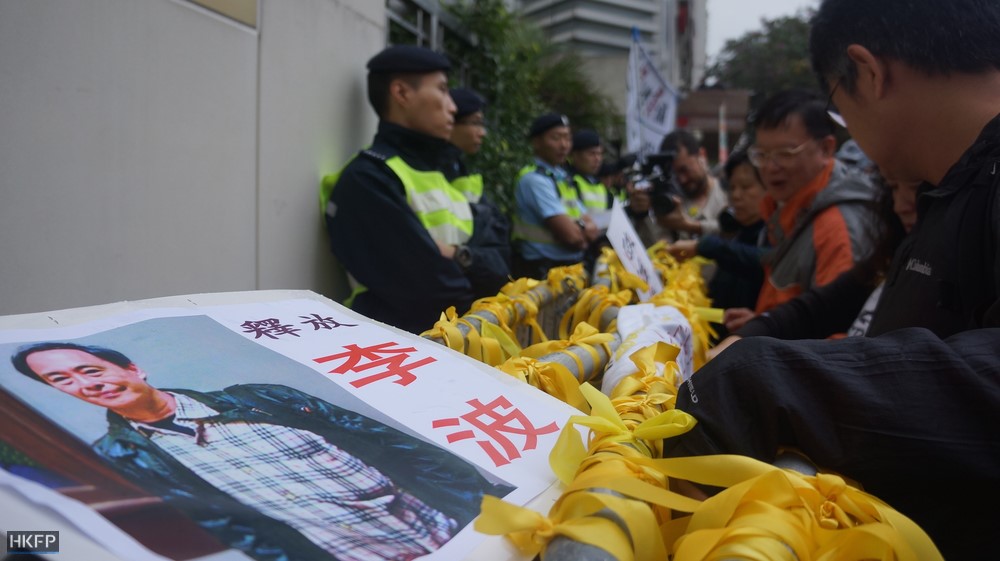Organisers say 6,000 people joined a rally on Sunday in response to the disappearance of Hong Kong bookseller Lee Bo.

Protesters marched from the Central Government Complex in Admiralty to the China Liaison Office in Sai Wan urging Beijing to respect the One Country, Two Systems agreement which guarantees Hong Kong’s autonomy.
Demonstrators march from the former site of the #Occupyhk protests chanting in support of missing bookseller Lee Bo pic.twitter.com/x7GR8tktnP
— Hong Kong Free Press (@HongKongFP) January 10, 2016
The turnout was higher than the expected 5,000.

Lee Bo, 65, a shareholder of banned book store, Causeway Bay Books, went missing from Hong Kong on December 30 last year. In a fax allegedly written by him and received by his wife last week, Lee said he had traveled to China voluntarily, saying “everything is fine.”

The suspicious circumstances led some to speculate that Lee might have been abducted and sent to mainland China through secret channels. On Saturday, a second letter and a video reportedly from Lee, urged the public not to make a “big fuss” out of his disappearance.

Daisy Chan Sin-ying, a former convenor of the Civil Human Rights Front, which organises the annual pro-democracy July 1 march, said today’s march was as significant as the ones she organised.

“This march is not simply fighting for justice for Lee Bo, as this matter is related to Chinese police enforcing law in Hong Kong, that the promises made to Hong Kong people were false after national security law is established in China, as you might be secretly kidnapped if you do anything that is still legal here,” she said.

Ms Lam, who marched with a poster urging freedom of the press and publication, said the new letter from Lee Bo made her and her friends come out to march.

“In a civilised place like Hong Kong, it is ridiculous for someone to disappear like that,” she said.

Another marcher, who gave his name as Alan, said that he did not understand why a new letter of Lee Bo emerged before the march, “but at least it is harder to hurt him now, as we know he is still alive.”

Shirley Yam Mei-ching, vice-chairperson of the Hong Kong Journalists Association (HKJA), said that anyone with knowledge of the mainland would question whether the new letter, allegedly written by Lee, was entirely a product of his own free will. “The matter as of now is not only about Lee Bo, but about the implementation of one country, two systems. Thus, even though Lee Bo urges [us] not to protest, the HKJA still decided to join this march.”

She said that there is suspicion that Lee’s wife is also under pressure not to draw further attention to the matter. “From the reactions of mainland state media on the case, we can see that this is now about whether if the human rights, freedom of press and freedom of publication promised under the one country, two systems are truly protected.”

Lew Mon-hung, a businessman and former member of China’s top political consultative body, also joined the march. He said the new letter from Lee Bo was “useless” in making Hong Kong people less worried.

“He was detained, his freedom [was] lost, fell under the control of the strong authorities, he is now being manipulated like a dough,” Lew said, explaining that the”strong authorities” mentioned by state media could be the Chinese police or the National Security Bureau. He said he hoped the march would “show Hong Kong people’s voice… So that the whole world will know Hong Kong people treasure the civil rights granted by the Basic Law, and the freedom from fear.”

Jason Chao Teng-hei, an activist from Macau, came to Hong Kong especially for the protest: “I think Macau shares the same fate as Hong Kong, if such abductions can occur in Hong Kong, it’s more likely that such activities will occur more often in Macau. I also have a duty to defend One Country, Two Systems and the autonomy of the Special Administrative Regions.”

He added that he had also heard about cases of Macau people “voluntarily” going to Zhuhai to assist in investigations.

